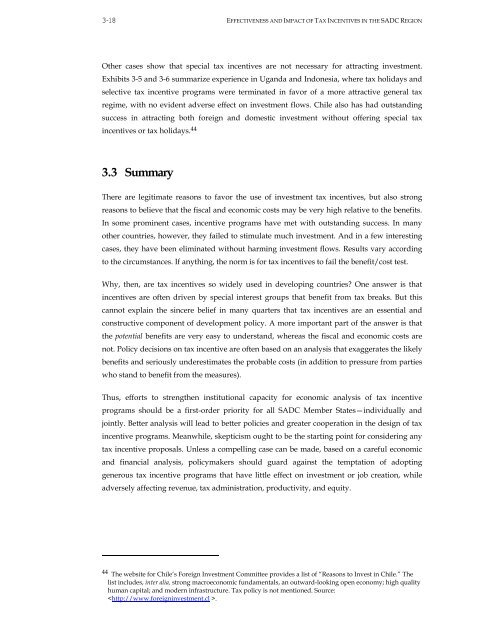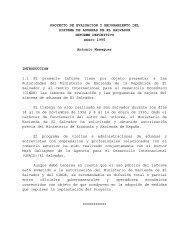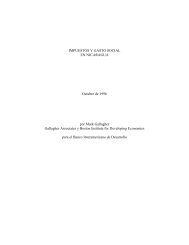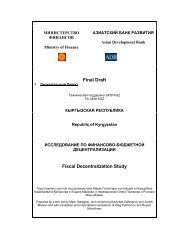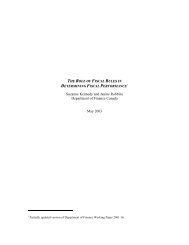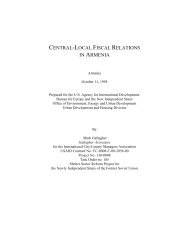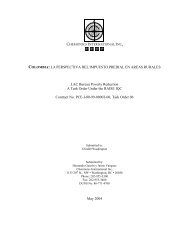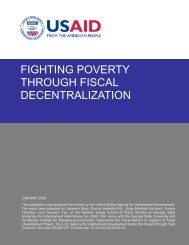Effectiveness and Economic Impact of Tax Incentives in the SADC ...
Effectiveness and Economic Impact of Tax Incentives in the SADC ...
Effectiveness and Economic Impact of Tax Incentives in the SADC ...
You also want an ePaper? Increase the reach of your titles
YUMPU automatically turns print PDFs into web optimized ePapers that Google loves.
3-18 EFFECTIVENESS AND IMPACT OF TAX INCENTIVES IN THE <strong>SADC</strong> REGION<br />
O<strong>the</strong>r cases show that special tax <strong>in</strong>centives are not necessary for attract<strong>in</strong>g <strong>in</strong>vestment.<br />
Exhibits 3-5 <strong>and</strong> 3-6 summarize experience <strong>in</strong> Ug<strong>and</strong>a <strong>and</strong> Indonesia, where tax holidays <strong>and</strong><br />
selective tax <strong>in</strong>centive programs were term<strong>in</strong>ated <strong>in</strong> favor <strong>of</strong> a more attractive general tax<br />
regime, with no evident adverse effect on <strong>in</strong>vestment flows. Chile also has had outst<strong>and</strong><strong>in</strong>g<br />
success <strong>in</strong> attract<strong>in</strong>g both foreign <strong>and</strong> domestic <strong>in</strong>vestment without <strong>of</strong>fer<strong>in</strong>g special tax<br />
<strong>in</strong>centives or tax holidays. 44<br />
3.3 Summary<br />
There are legitimate reasons to favor <strong>the</strong> use <strong>of</strong> <strong>in</strong>vestment tax <strong>in</strong>centives, but also strong<br />
reasons to believe that <strong>the</strong> fiscal <strong>and</strong> economic costs may be very high relative to <strong>the</strong> benefits.<br />
In some prom<strong>in</strong>ent cases, <strong>in</strong>centive programs have met with outst<strong>and</strong><strong>in</strong>g success. In many<br />
o<strong>the</strong>r countries, however, <strong>the</strong>y failed to stimulate much <strong>in</strong>vestment. And <strong>in</strong> a few <strong>in</strong>terest<strong>in</strong>g<br />
cases, <strong>the</strong>y have been elim<strong>in</strong>ated without harm<strong>in</strong>g <strong>in</strong>vestment flows. Results vary accord<strong>in</strong>g<br />
to <strong>the</strong> circumstances. If anyth<strong>in</strong>g, <strong>the</strong> norm is for tax <strong>in</strong>centives to fail <strong>the</strong> benefit/cost test.<br />
Why, <strong>the</strong>n, are tax <strong>in</strong>centives so widely used <strong>in</strong> develop<strong>in</strong>g countries? One answer is that<br />
<strong>in</strong>centives are <strong>of</strong>ten driven by special <strong>in</strong>terest groups that benefit from tax breaks. But this<br />
cannot expla<strong>in</strong> <strong>the</strong> s<strong>in</strong>cere belief <strong>in</strong> many quarters that tax <strong>in</strong>centives are an essential <strong>and</strong><br />
constructive component <strong>of</strong> development policy. A more important part <strong>of</strong> <strong>the</strong> answer is that<br />
<strong>the</strong> potential benefits are very easy to underst<strong>and</strong>, whereas <strong>the</strong> fiscal <strong>and</strong> economic costs are<br />
not. Policy decisions on tax <strong>in</strong>centive are <strong>of</strong>ten based on an analysis that exaggerates <strong>the</strong> likely<br />
benefits <strong>and</strong> seriously underestimates <strong>the</strong> probable costs (<strong>in</strong> addition to pressure from parties<br />
who st<strong>and</strong> to benefit from <strong>the</strong> measures).<br />
Thus, efforts to streng<strong>the</strong>n <strong>in</strong>stitutional capacity for economic analysis <strong>of</strong> tax <strong>in</strong>centive<br />
programs should be a first-order priority for all <strong>SADC</strong> Member States—<strong>in</strong>dividually <strong>and</strong><br />
jo<strong>in</strong>tly. Better analysis will lead to better policies <strong>and</strong> greater cooperation <strong>in</strong> <strong>the</strong> design <strong>of</strong> tax<br />
<strong>in</strong>centive programs. Meanwhile, skepticism ought to be <strong>the</strong> start<strong>in</strong>g po<strong>in</strong>t for consider<strong>in</strong>g any<br />
tax <strong>in</strong>centive proposals. Unless a compell<strong>in</strong>g case can be made, based on a careful economic<br />
<strong>and</strong> f<strong>in</strong>ancial analysis, policymakers should guard aga<strong>in</strong>st <strong>the</strong> temptation <strong>of</strong> adopt<strong>in</strong>g<br />
generous tax <strong>in</strong>centive programs that have little effect on <strong>in</strong>vestment or job creation, while<br />
adversely affect<strong>in</strong>g revenue, tax adm<strong>in</strong>istration, productivity, <strong>and</strong> equity.<br />
44 The website for Chile’s Foreign Investment Committee provides a list <strong>of</strong> “Reasons to Invest <strong>in</strong> Chile.” The<br />
list <strong>in</strong>cludes, <strong>in</strong>ter alia, strong macroeconomic fundamentals, an outward-look<strong>in</strong>g open economy; high quality<br />
human capital; <strong>and</strong> modern <strong>in</strong>frastructure. <strong>Tax</strong> policy is not mentioned. Source:<br />
.


